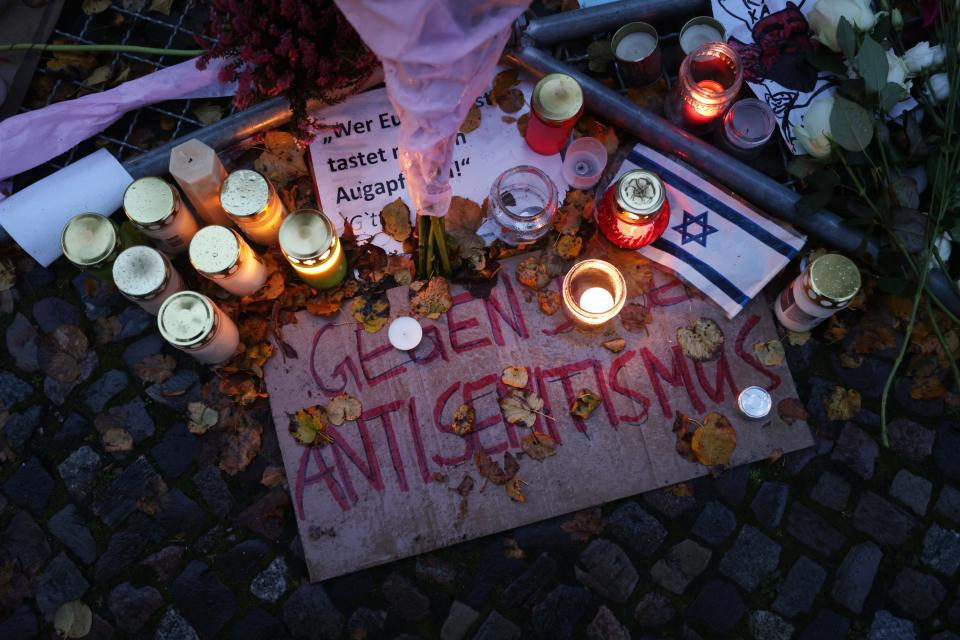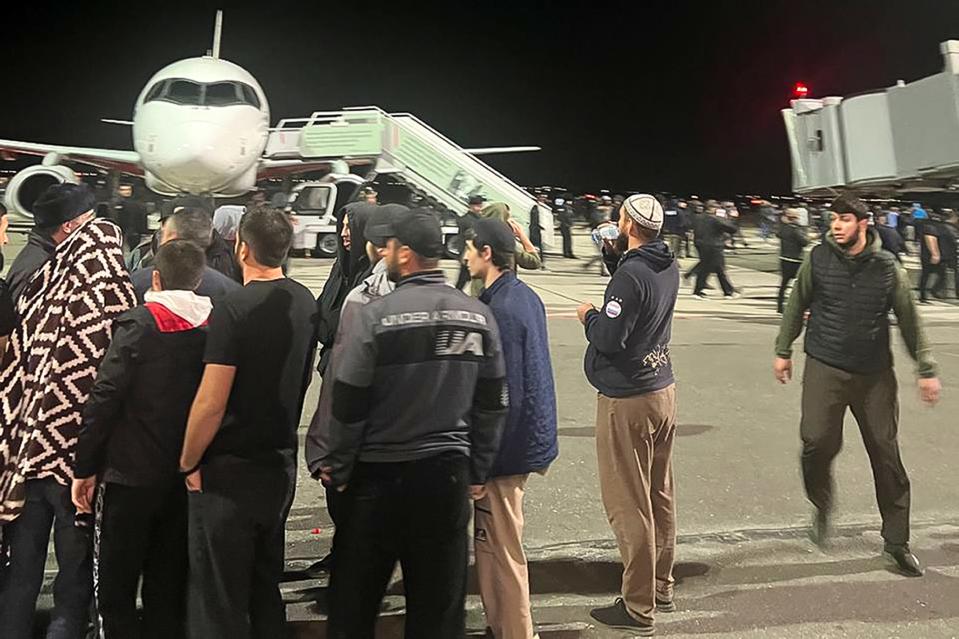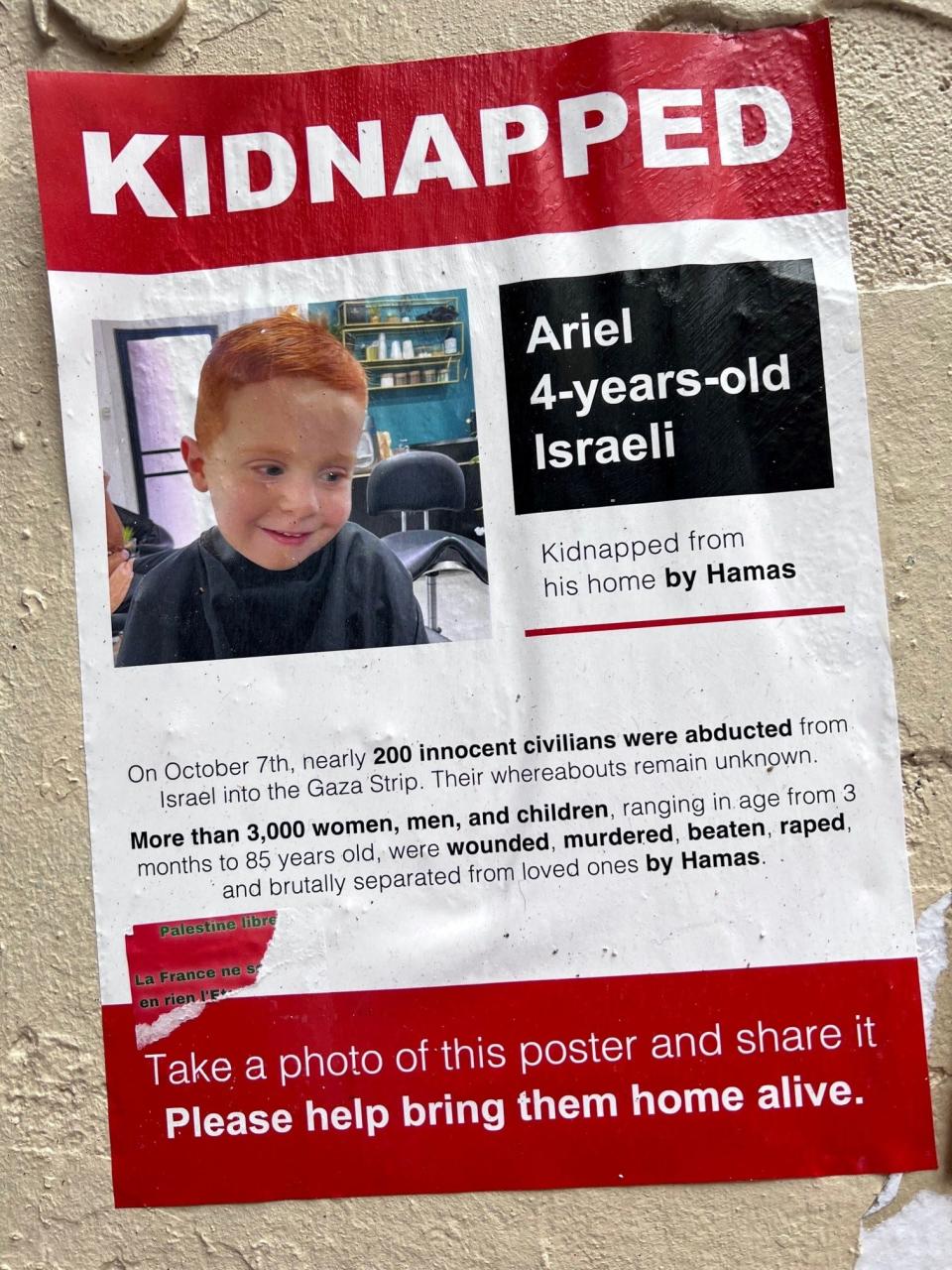Hurling insults, Molotov cocktails, mezuzahs removed: Jews live in fear as antisemitism rages
A mob stormed a Russian airport over the weekend trying to stop a plane from arriving from Tel Aviv, Israel. Dozens of pro-Palestinian protesters in Barcelona last week occupied a hotel owned by an Israeli businessman.
And in Berlin, vandals hurled Molotov cocktails at a synagogue last week and scrawled the Star of David on the doors of homes and apartment buildings where Jews live.
An alarming rise in antisemitic acts reported across Europe and the United States in the three weeks since Hamas and Israel went to war is striking fear into the lives of Jewish people like Edward Touret.
Touret, who owns a delicatessen in the heart of Paris’ old Jewish quarter, recently removed the mezuzah from the door of his home near the Eiffel Tower. The scroll of parchment affixed on front doorposts is an important symbol in the Jewish faith, but Touret didn’t want delivery drivers or other passersby to know that the family who lives there is Jewish. On the advice of a rabbi, he took it down and moved it inside.
“People are scared,” he said.
Antisemitism on campus: Calls for raping and killing Jewish students at Cornell bring police response, condemnation

France, which has the world’s largest Jewish population outside of Israel and the United States, has seen a surge in antisemitic acts since Hamas’ bloody attack on southern Israel on Oct. 7. Some 1,400 Israelis were slaughtered. Victims were executed, bound and burned alive and other bodies were found decapitated. Over 200 people were kidnapped. The horrific attack touched off a war that so far has led to the deaths of more than 8,000 Palestinians, most of them civilians, according to the Hamas-run health ministry.
France’s Interior Ministry reported 719 antisemitic acts and 389 arrests between Oct. 7 and Friday. The government said the figures include threats against Jewish people.
Elsewhere, Germany reported 202 antisemitic acts a week after the start of the conflict, a 240% increase over the same period a year ago. In the United States, the Anti-Defamation League said it recorded 312 antisemitic acts between Oct. 7 and Oct. 23. Of those, 190 were directly linked to the war between Israel and Hamas, the group said. Overall, acts of harassment, vandalism and assault in the U.S. are up by 388% over last year, the group said.
Antisemitism is a negative perception, or even hatred, of Jews, according to theInternational Holocaust Remembrance Alliance, an intergovernmental organization founded to promote Holocaust education and remembrance. It can be directed at Jewish people or those perceived to be Jewish, as well as their property, institutions and religious facilities. Since the establishment of Israel in 1948, the alliance has expanded the definition of antisemitism to include “holding Jews collectively responsible for actions of the state of Israel.”
“The dramatic rise in antisemitism has the Jewish communities very much on edge in every part of the world,” said Ted Deutch, chief executive officer of the American Jewish Committee, a Jewish advocacy group.
Antisemitism is a global crisis that needs to be addressed by not only the leadership of the Jewish community, Deutch said, “it requires the leadership of the broader community to stand up and be very explicit in saying that antisemitism cannot be tolerated, not today and not ever.”
What is antisemitism? A look at the many ways the age-old hatred manifests
In France, 'a real fear'
In France, Jewish-owned restaurants, shops and even synagogues are reporting a sharp decline in business. The spike in antisemitism has left many Jewish people afraid to leave their homes.
“We can see a real fear and withdrawal of the Jewish community in France,” said Patrick Chlewicki, president of the Synagogue de la Place des Vosges, which sits in a historic district in Paris that is home to Jews who fled the hostility of Eastern European countries before World War II.
France has a tortured history of antisemitism, stretching from a political scandal in the late 1890s when Jewish army Capt. Alfred Dreyfus was put on trial and falsely convicted of passing military secrets to the Germans, to the Vichy regime’s collaboration with the Nazis during World War II.
Since the start of the Israel-Hamas war, French authorities have received reports of antagonizers hurling verbal abuse at Jews, of people with knives near Jewish schools and synagogues and of a drone equipped with a camera spotted over a Jewish cultural center. More than 2,000 cases of antisemitic speech have been reported to an online watchdog force.
Attendance at the Sunday classes that Chlewicki's synagogue offers for children has dropped off by almost half since Oct. 7, he said.
Sales at Touret’s deli, the Florence Kahn Bakery and Delicatessen, are down 15% to 20%. “We've had some cancellations from some customers who didn't wish to come to the Jewish quarter right now,” Touret said.
Chlewicki’s son-in-law, Bryan Levy, who lives in Miami but owns kosher butcher shops and restaurants in Paris, said just two customers showed up at one of his restaurants for dinner a few days ago.
“That has never happened,” Levy said, “not even during COVID when everybody was really scared.”

'Another level of horror'
One of Levy’s butcher shops is just a one-minute drive from the Hypercacher supermarket, which was attacked in 2015 by a gunman who killed four Jewish people and held 15 others hostage. Two days before the attack, a man wandered into the shop and started asking odd questions, like whether the store was kosher and how many of its customers were Jewish.
“I very gently pushed him out of the store,” Levy recalled.
He didn’t report the incident to the police and never found out whether the man was tied to the Hypercacher attack. But he has a feeling the suspect may have been staking out the store as a potential target.
Levy’s wife, Kelly Levy, worries about relatives back in France given the recent rise of antisemitism. Two of her grandparents are Holocaust survivors.
Her grandfather survived the atrocities of the Auschwitz-Birkenau concentration camp and was eventually reunited with his parents and siblings. Her grandmother stayed alive by hiding in a convent with two sisters in the south of France. After the war, the young woman returned to Paris only to find that her parents had been gassed to death in Auschwitz. For years, until her death at age 96, she would sit in her mother’s seat at the synagogue and weep.
“She would always cry like the young girl she was when she lost her mother,” Kelly Levy recalled.
Kelly Levy said she witnessed antisemitism growing up in Paris. Her best friend was beaten up in the street one day because she looked Jewish.
Today, Levy works with the grandchildren of other Holocaust survivors through a group called 3GMiami and often goes into school classrooms to share her grandparents’ story. Levy said she has worked hard to educate herself on injustice – against Palestinians as well as Jews – and cries over every life lost to terrorism.
“I was always the first one to condemn any form of injustice to any kind of people,” she said. “And now what is hurting the most when I see those protests in France and in Germany and in London is it’s another level of horror. It hurts me so much because how hard can it be to condemn the acts of terrorism that occurred on Oct. 7?”
For Touret, the rise in antisemitism in the United States is especially troubling. He always thought he’d go to the U.S. if he ever felt unsafe in France.
“Now people are scared to come to the U.S.,” he said.
Poll: Americans overwhelmingly back Israel in war with Hamas but fear wider conflict
'Bring them home alive'

Back in Paris, meanwhile, a torn poster on a wall next to Touret’s delicatessen symbolizes how the Israel-Hamas war continues to stir emotions and stoke divisions.
On the flier, the smiling face of a 4-year-old Israeli boy with bright red hair stares out at passersby. His name is Ariel. He has been missing since Oct. 7, when Hamas abducted nearly 200 civilians during its deadly attack on Israel.
“KIDNAPPED,” screams the all-caps inscription embedded in a blood-red border above Ariel’s photo.
Not long after the poster went up, pro-Palestinian groups slapped a sticker on it warning that Israel will never be accepted and expressing support for the Palestinian cause.
A few days later, someone else tore off those stickers. Left intact was a plea on behalf of Ariel and the other hostages: “Please bring them home alive.”
Michael Collins covers the White House. Follow him on X, formerly Twitter, @mcollinsNEWS.
Contributing: The Associated Press.
'I won't condemn Hamas': Some Palestinians find it hard to denounce attacks on Israel
This article originally appeared on USA TODAY: Jews describe chilling antisemitism as Israel-Gaza war rages on

 Yahoo Sports
Yahoo Sports 